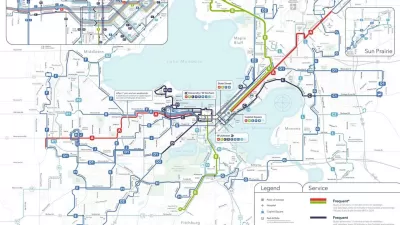Transit advocates are launching a new push for federal funding aid to increase service on existing transit routes.
In a movement that recalls, with substantive differences, the "fix it first" approach to automobile infrastructure, transit advocates are calling for a new attention by governments of all level to improving transit service as it exists, rather than solely spending scarce transit funds on capital investments.
An article and video (the latter shown above) by TransitCenter makes the case for investing in transit operations as a solution to climate change and racial inequality in the United States.
According to both the article and the video, "increasing the amount of service by 40% can dramatically expand access to good transit and bring many more jobs within reach of riders." The federal government, under new leadership, could assist in this effort by adding to funding pools for local transit operations. "Since the Reagan administration, however, the vast majority of federal transit funding has supported capital projects, not operations. That finally changed last year in response to the pandemic, with relief funding in the CARES Act providing a lifeline for agencies to keep buses and trains running."
At the Human Transit blog, transit planning consultant Jarrett Walker supplements these TransitCenter communications with his own take on the reprioritization of transit funding.
"If you want to transform public transit for the better in the US, there’s useful infrastructure you could build, but the quickest and most effective thing you could do is just run a lot more buses," writes Walker. Luckily there's a model available from country's neighbor to the north. According to Walker, the United States doesn't need to copy Europe, when Canada excels at attracting transit riders by running more transit service. Still, even the 40 percent increase targeted by Transit Center wouldn't bring the United States up to par with the Canadian example.
FULL STORY: New Video: To Tackle the Climate Crisis and Racial Inequity, We Need to Run a Lot More Transit Service

Planetizen Federal Action Tracker
A weekly monitor of how Trump’s orders and actions are impacting planners and planning in America.

Congressman Proposes Bill to Rename DC Metro “Trump Train”
The Make Autorail Great Again Act would withhold federal funding to the system until the Washington Metropolitan Area Transit Authority (WMATA), rebrands as the Washington Metropolitan Authority for Greater Access (WMAGA).

The Simple Legislative Tool Transforming Vacant Downtowns
In California, Michigan and Georgia, an easy win is bringing dollars — and delight — back to city centers.

The States Losing Rural Delivery Rooms at an Alarming Pace
In some states, as few as 9% of rural hospitals still deliver babies. As a result, rising pre-term births, no adequate pre-term care and "harrowing" close calls are a growing reality.

The Small South Asian Republic Going all in on EVs
Thanks to one simple policy change less than five years ago, 65% of new cars in this Himalayan country are now electric.

DC Backpedals on Bike Lane Protection, Swaps Barriers for Paint
Citing aesthetic concerns, the city is removing the concrete barriers and flexposts that once separated Arizona Avenue cyclists from motor vehicles.
Urban Design for Planners 1: Software Tools
This six-course series explores essential urban design concepts using open source software and equips planners with the tools they need to participate fully in the urban design process.
Planning for Universal Design
Learn the tools for implementing Universal Design in planning regulations.
Smith Gee Studio
City of Charlotte
City of Camden Redevelopment Agency
City of Astoria
Transportation Research & Education Center (TREC) at Portland State University
US High Speed Rail Association
City of Camden Redevelopment Agency
Municipality of Princeton (NJ)





























